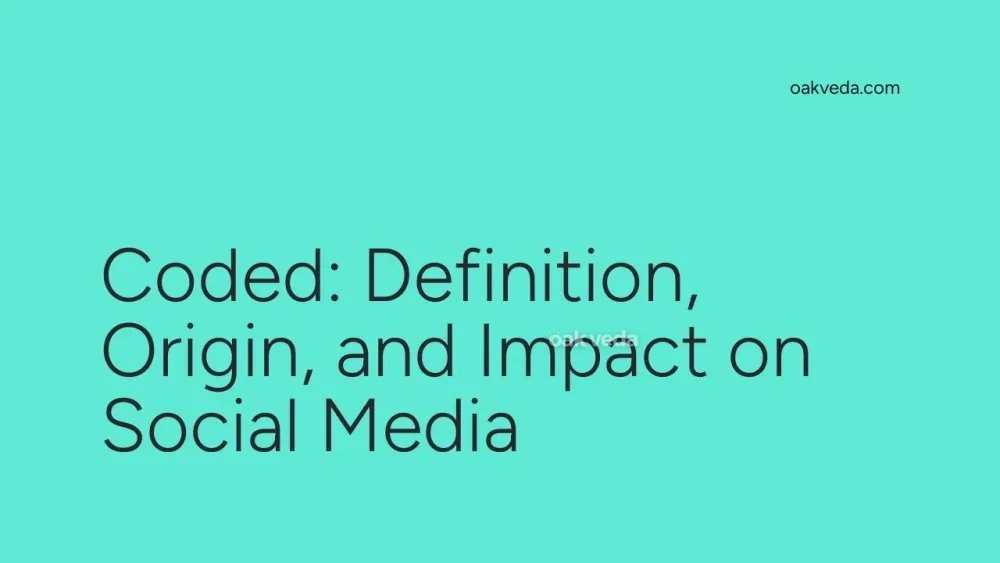
What is Coded?
In the realm of social media, "coded" is a slang term used to describe someone or something that exhibits stereotypical or shared traits associated with a particular character, group, or concept. This term has become increasingly popular in online discussions, particularly when analyzing fictional characters, celebrities, or even everyday situations.
Origin and Development of Coded
The term "coded" in its current social media context originated from a 2015 Tumblr conversation about the animated series Steven Universe. Initially, users discussed the concept of characters being "racially coded," despite the show's aliens being intended as asexual and non-racial. The conversation focused on the character Garnet being "Black coded," which sparked widespread use of the term.
Since then, "coded" has evolved to encompass a broader range of characteristics and references. It has become a versatile way to describe various traits and associations in popular culture and everyday life.
How Coded Works
When someone uses the term "coded," they are essentially drawing parallels between the subject and a well-known reference point. This comparison helps to quickly convey a set of characteristics or behaviors without having to explain them in detail. For example:
- "She's totally Hermione coded" might suggest that a person is intelligent, studious, and perhaps a bit bossy.
- "That restaurant is hipster coded" could imply that the establishment has a certain aesthetic, menu, or atmosphere associated with hipster culture.
Types or Variations of Coded
The versatility of "coded" has led to numerous variations, each focusing on different aspects of identity, behavior, or cultural references. Some common types include:
- Character coded: Referring to traits associated with fictional characters (e.g., "Batman coded" for someone mysterious and brooding)
- Gender coded: Describing traits traditionally associated with specific genders (e.g., "femme coded" or "masc coded")
- Race coded: Discussing racial stereotypes or characteristics (e.g., "Black coded" or "Asian coded")
- Personality coded: Relating to specific personality types or disorders (e.g., "introvert coded" or "ADHD coded")
- Pop culture coded: Referencing traits associated with celebrities, movies, or TV shows (e.g., "90s sitcom coded")
Popular Examples of Coded
The use of "coded" has become widespread across various social media platforms. Here are some popular examples:
- "That villain is queer coded" - Often used to discuss LGBTQ+ representation in media
- "He's such a dad coded character" - Describing a character with stereotypical "dad" traits
- "This meme is millennial coded" - Suggesting the meme resonates particularly with millennial humor or experiences
Impact of Coded on Social Media Culture
The proliferation of "coded" in social media discourse has had several notable impacts:
- Enhanced communication: It allows users to convey complex ideas quickly and efficiently.
- Community building: Shared understanding of these codes can create a sense of belonging among like-minded individuals.
- Critical analysis: It encourages users to examine media and social interactions more closely, identifying patterns and representations.
- Meme culture: "Coded" has become a meme in itself, spawning countless variations and jokes.
Controversies or Debates Surrounding Coded
While "coded" can be a useful shorthand, it's not without controversy:
- Oversimplification: Critics argue that it can lead to reductive thinking and stereotyping.
- Misinterpretation: The subjective nature of coding can lead to disagreements and misunderstandings.
- Overuse: Some feel the term has become overused, diluting its meaning and impact.
How Brands and Influencers Use Coded
Savvy brands and influencers have begun to leverage the concept of "coded" in their marketing strategies:
- Character-based marketing: Creating mascots or brand personalities that are "coded" to appeal to specific demographics.
- Trend analysis: Using "coded" discussions to identify emerging trends and consumer preferences.
- Content creation: Developing content that is intentionally "coded" to resonate with target audiences.
Future Trends Related to Coded
As social media continues to evolve, we can expect the use of "coded" to adapt and expand:
- AI and machine learning: Potential development of algorithms to identify and analyze "coded" content.
- Cross-cultural coding: Increased understanding and use of "coded" references across different cultures and languages.
- Academic interest: Growing scholarly attention to the phenomenon of social media coding and its societal implications.
FAQs about Coded
-
Is "coded" only used on social media? While it originated and is most prevalent on social media, the term has begun to appear in broader cultural discussions and academic contexts.
-
Can anything be "coded"? In theory, yes. As long as there's a recognizable set of traits or characteristics to reference, it can be described as "coded."
-
Is using "coded" language considered offensive? It depends on the context. While often neutral or positive, it can be problematic if used to reinforce harmful stereotypes or oversimplify complex identities.
-
How can I use "coded" correctly in conversations? Be mindful of context, avoid reinforcing negative stereotypes, and be prepared to explain your reference if others are unfamiliar with it.
Understanding the concept of "coded" in social media can provide valuable insights into online communication trends and cultural analysis. As this linguistic phenomenon continues to evolve, it will undoubtedly play a significant role in shaping digital discourse and content creation strategies.
You may be interested in:
- Social Listening: Definition, Origin, and Impact
- Altered My Brain Chemistry: Definition, Origin, and Impact
- Loop: Definition, Origin, and Impact on Social Media
- Natural Language Processing: Definition, Origin, and Impact
- Social Proof: Definition, Origin, and Impact on Digital Marketing
- Instagram Carousel: Definition, Origin, and Impact

